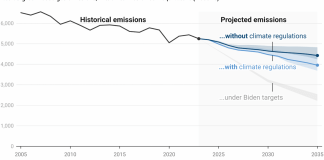A home electrification and solar pilot program for lower-income Cape Cod and Martha’s Vineyard residents is cutting participants’ energy bills nearly 60% and is expected to inform Massachusetts’ ongoing efforts to bring renewable energy and energy efficiency to all households.
“What the commonwealth has to have available, if we’re going to even hope to achieve our climate goals, is that there have to be options for people at every income level,” said Maggie Downey, chief administrative officer of the Cape Light Compact, the organization that administered the pilot.
The program, known as the Cape and Vineyard Electrification Offering, gave solar panels to all 55 participating households and heat pumps to 45 of those, most at no cost and some with a low co-payment, depending on income levels. Twelve households also received batteries, and some got electric dryers and stoves, to transition the homes completely off fossil fuels. Installations began in January 2024, and the final one wrapped up in May 2025.
The results: The average household is saving some $150 per month on energy costs and reducing net electricity use by 59% by getting much of its needed power from the on-site solar panels, according to an analysis published by the consultancy Guidehouse at the end of last month. Perhaps unsurprisingly, participating residents are quite satisfied with these outcomes, giving the program an exceptionally good “net promoter score” of 71%.
“My costs are drastically lower,” said Judy Welch, a homeowner in the Cape Cod town of Chatham who was one of the first folks to sign on for the upgrades. “In the summer now, I don’t have any bills, and I have the air conditioning on the whole time.” Her winter energy bills have also dropped to nearly zero thanks to the solar-powered heat pumps; previously, Welch paid around $500 a month to run electric baseboard heating.
Massachusetts has long had strong incentives for renewable energy and been a leader in policies promoting energy efficiency. The state has had less success, however, in helping lower-income households realize the benefits of these measures. At the same time, Massachusetts residents — especially those who make less money — face some of the highest energy burdens in the country. On Cape Cod, households making less than one-third of the area median income spent an average of 27% of their income on energy as of 2023, according to data from the U.S. Department of Energy. (An updated figure is unavailable because the federal tool that provided this data is no longer live.)
The Cape and Vineyard Electrification Offering was conceived of as a way to overcome the sometimes unmanageable up-front cost of efficiency and clean energy upgrades, and to amplify the impact of individual technologies by deploying them together. Solar panels would keep down the cost of operating heat pumps, and batteries would maximize the amount of zero-cost electricity available to each home.
“It’s all bundled for the participant in a way that makes sense and optimizes all these different systems and combines them through one program,” said Todd Olinsky-Paul, senior project director for the Clean Energy Group, a Vermont-based nonprofit that advocates for a just energy transition. “I haven’t seen that anywhere else.”
The pilot was designed and offered by the Cape Light Compact, a unique regional organization that negotiates electric supply prices and administers energy-efficiency programming for the 21 towns on Cape Cod and Martha’s Vineyard. The compact proposed versions of the pilot in 2018, 2020, and 2021, before the state gave it the go-ahead in 2023.
Great Job Sarah Shemkus & the Team @ Canary Media Source link for sharing this story.




